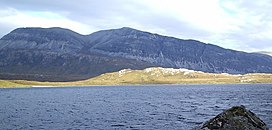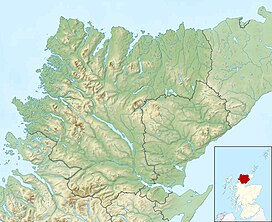Arkle (Scottish Gaelic: Airceil[3]) is a mountain in Sutherland, in the far north-west corner of the Scottish Highlands. Like its sister Foinaven, the mountain is made up of glistening white Cambrian quartzite, laid down around 530 million years ago on an uneven basement of much older Lewisian gneiss. The quartzite, and the Torridonian sandstone which makes up many of the other mountains in the area, have been dissected by rivers and glaciers, leaving a series of isolated peaks, such as Suilven, Quinag and Stac Pollaidh, standing above the "knock and lochan" landscape of small hills and lakes that is typical of the Lewisian gneiss.
| Arkle | |
|---|---|
 Arkle above the shores of Loch Stack | |
| Highest point | |
| Elevation | 787 m (2,582 ft) |
| Prominence | 690 m (2,260 ft) |
| Listing | Marilyn, Corbett |
| Naming | |
| Etymology | Norse ark-fjell, "flat-topped hill"[1] or Scottish Gaelic airceal/airceil, "hiding-place"[2] |
| Native name | Airceil (Scottish Gaelic) |
| Pronunciation | /ˈɑːrkəl/ |
| Geography | |
| Parent range | Northwest Highlands |
| OS grid | NC302461 |
| Topo map | OS Landranger 9 |
'Ben Arkle' was the subject of a painting by Charles, Prince of Wales. This painting was reproduced by the British Post Office as one of a set of five stamps (SG 1810–1814, issued 1 March 1994) showing paintings by Prince Charles and also, as a commemorative label, in a stamp book (SG HB16) issued 14 November 1994 to celebrate the Prince's 50th birthday.
Arkle, the Irish thoroughbred racehorse, was named after the mountain.[4] 58°22′13″N 4°54′17″W / 58.37033°N 4.90485°W
References
edit- ^ Murray, Ian; Watson, Adam (1 January 2015). Place name discoveries on Upper Deeside and the far Highlands. Paragon Publishing. ISBN 9781782223276 – via Google Books.
- ^ "Old-lore Miscellany of Orkney, Shetland, Caitness and Sutherland". Viking club. 12 March 2019 – via Google Books.
- ^ "The Celtic Review". Norman Macleod. 15 July 1905. Retrieved 16 December 2024 – via Internet Archive.
- ^ "The legend of Arkle". BBC. 20 February 2004. Retrieved 26 July 2022.
